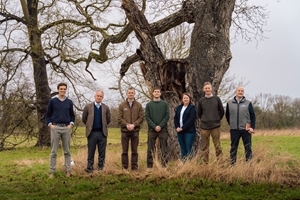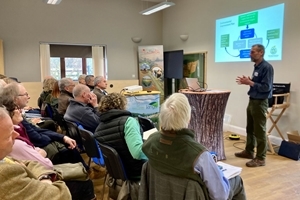 The Environmental Farmers Group (EFG) has launched its latest and largest equalisation cell including catchments in Northamptonshire, Leicestershire, Rutland, Lincolnshire, Cambridgeshire, Bedfordshire, Buckinghamshire and Oxfordshire.
The Environmental Farmers Group (EFG) has launched its latest and largest equalisation cell including catchments in Northamptonshire, Leicestershire, Rutland, Lincolnshire, Cambridgeshire, Bedfordshire, Buckinghamshire and Oxfordshire.
Over 170 farmers gathered at the Allerton Project in Leicestershire and Courteenhall Estate in Northamptonshire to launch the new Central England cell of the EFG. The pioneering environmental cooperative provides natural capital investors with a single point of contact and aims to ensure that farmers receive fair reward for delivering nature recovery and climate change mitigation on a huge scale. EFG has already built a trading funnel with 22 trading opportunities worth over £25m.
Natural Capital Advisory (NCA), a subsidiary of the Game & Wildlife Conservation Trust (GWCT), brokers trades on behalf of EFG and provides its environmental auditing service, guaranteeing a high level of assurance. GWCT chief exec Teresa Dent said: “It’s wonderful that such a large group of neighbouring farmers has shown enthusiasm for the concept of the rapidly expanding EFG. We look forward to welcoming them into the wider group and working with them on their large-scale conservation plan whilst helping them develop their distinctive cell with its unique geographical and cultural identity. Given the group’s proximity to large industrial urban areas there is huge potential for Central England farmers to play a key role in delivering statuary and voluntary environmental offsets, meeting and beating government nature positive targets in the process.”
Combined with its developing sister environmental cooperatives the EFG now represents an impressive 660,000 acres or 3% of England’s farmed area. Its 560 farmer members and registered Expressions of Interest support the central aims of Biodiversity & Species Recovery by 2030, Clean Water and Carbon Net Zero by 2040.
The cooperative’s structure of equalisation cells ensures all their members benefit financially from any trade done by the group. The cells are made up of clusters of neighbouring farmers, which offers investors greater value through interconnected catchment-scale projects that can be easily measured and monitored.
 Professor Chris Stoate, Head of Research at the GWCT Allerton Project Demonstration Farm, is a member of the Central England EFG steering committee. Speaking at the launch, he said: “For the past 30 years scientific research at the Allerton Project has been focused on delivering nature recovery alongside profitable farming. The EFG is a fantastic mechanism by which we can disseminate the wide range of evidence-based environmental measures we have developed. Our work on water-friendly farming will be of particular relevance as the Central England region feeds many of the UK’s biggest river catchments. It is also a natural progression for our local farmer cluster to join the wider cooperative connecting neighbouring farms over a huge area.”
Professor Chris Stoate, Head of Research at the GWCT Allerton Project Demonstration Farm, is a member of the Central England EFG steering committee. Speaking at the launch, he said: “For the past 30 years scientific research at the Allerton Project has been focused on delivering nature recovery alongside profitable farming. The EFG is a fantastic mechanism by which we can disseminate the wide range of evidence-based environmental measures we have developed. Our work on water-friendly farming will be of particular relevance as the Central England region feeds many of the UK’s biggest river catchments. It is also a natural progression for our local farmer cluster to join the wider cooperative connecting neighbouring farms over a huge area.”
Central England promises to have the largest geographical spread of all the EFG cells, with the potential to cover 710,000 hectares. By blending public and private finance it aims to help farmers fill the future funding gap, with £125m due to be lost annually from BPS payments in the Central England area alone.
Dr Johnny Wake is Chairman of EFG Central England and managing partner of Courteenhall Farms in Northamptonshire. He said: “We were delighted to host more than 100 farmers at one of the two inaugural meetings of the new EFG group here at Courteenhall and the Allerton Project launch event was equally well attended. We’ve had a wide range of land managers showing interest from smallholders to big estates and tenant farmers to landlords. As the biggest group geographically, we have got an exciting opportunity to deliver environmental improvement at scale and to help our members to gain access to natural capital markets. We look forward to welcoming interested farmers to our next meeting at Boughton in Northamptonshire on 17 April 2024.”
Notes for editors
What is the Environmental Farmers Group (EFG)?
The EFG is a group of accredited, progressive farmers ready to trade through a single hub. This makes it easier for both the farmer and the business seeking the trade. EFG acts as a trusted navigator for its farmer members and by joining, farmers have access to a large amount of information and expertise on the natural capital sector. We work closely both with Government and key stakeholders within the Green Finance Industry and all trades are highly assured through long-term scientific monitoring undertaken by NCA. The farmers retain decision-making control, and each individual decides how much or how little they contribute to the whole. We believe, by working collaboratively, farmers can deliver ambitious environmental outcomes and should earn a fair reward for doing this.
What is Natural Capital Advisory (NCA)?
Natural Capital Advisory’s mission is to use its combined expertise in natural science and business to deliver the very best environmental and financial outcomes from the Natural Capital market. NCA has five main activities to achieve its vision of delivering environmental goods for fair reward: environmental auditing, convening groups of farmers, brokering environmental trades and monitoring environmental projects. It operates in line with international conservation standards, providing the highest level of assurance both for farmers and natural capital investors.
What is the Game & Wildlife Conservation Trust (GWCT)?
Foremost a scientific body, the GWCT employs 22 post-doctoral scientists and 50 other research staff with expertise in birds, insects, mammals, farming, fish and statistics. Its advice to private land managers is based on findings from its peer-reviewed research. As a result of this evidence-led approach, statutory bodies including Defra, Natural England, Scottish Natural Heritage and Natural Resources Wales have based much agri-environment policy on GWCT research. The Trust is also responsible for a number of Government Biodiversity Action Plan species and is lead partner for grey partridge and joint lead partner for brown hare and black grouse.
For information, contact:
Joe Dimbleby
Telephone: 07708 200856
Email: jdimbleby@gwct.org.uk